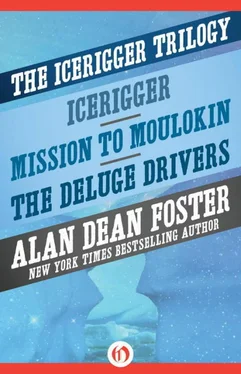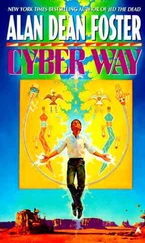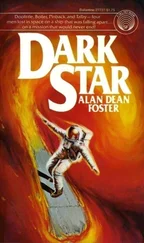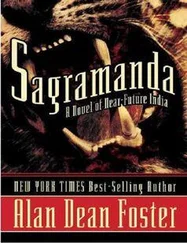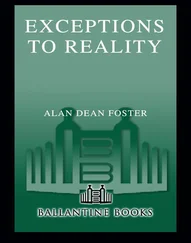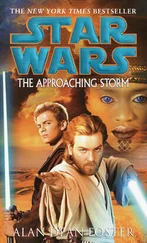“That is obvious.” As if he were discussing something quite ordinary, he leaned on his spear and rubbed idly at the finely woven vest he wore. “From which star, and how far away?”
It was not lack of vocabulary that rendered Ethan momentarily speechless. When his thoughts stopped whirling he thought to gesture at the billowing steam. “Your land must always be like this. How do you know of other stars when you can’t even see the sky? And what makes you think other people live out among them?”
“Legends.” The Saia shifted his position slightly. “We have many legends. They are our heritage. We regard them properly.”
There was truly, Ethan thought, something of a vanished grandeur about these people. They carried themselves differently than the average Tran, as if conscious of their specialness, of a uniqueness that extended beyond mere physical differences.
Had high civilizations once existed on Tran-ky-ky? If so, were these Saia remnants of such civilizations? Or were they perhaps simply recipients of knowledge handed to them by other peoples, now extinct or else from offworld? Did that make Hunnar and his people—and all other Tran—degenerate offshoots of a higher species instead of the pinnacle of Tran evolution?
Manner and alterations in form were not sufficient proof of superiority, however. Hunnar and his companions probably regarded the absence of long fur, dan and chiv as deformities, not as evidence of advanced evolution. And what of the attire of these Saia? Simple vests and skirts, a well-formed but basic metal axe slung at one hip, spears—nothing to hint at knowledge of advanced technologies. They seemed as barbaric in achievement if not attitude as any other Tran.
It was only that—Ethan hunted for the right concept-—that they appeared more advanced psychologically. They were open and friendly, instead of as withdrawn and suspicious as other Tran. Many primitive peoples refined the characteristic of seeming to know more than they actually did. It would be to their advantage, especially if they were numerically weak, to cultivate such an impression. Claims of supernatural abilities or lineage to powerful ancestors would help them awe more warlike relatives such as the Moulokinese. Protective coloring can be verbal as much as physical, he reminded himself, without losing its effectiveness.
Not that they were weak and helpless. The axe and metal-tipped spears looked efficient if not advanced. At least their metallurgical skill hadn’t been exaggerated by the worshipful folk of Moulokin.
“Whither do you go, strangers?” the middle Saia inquired, after efforts to identify a Commonwealth star or two met insurmountable semantic barriers.
Ethan pointed south westward. “To the interior of this land, and further. To explore and hopefully find another canyon similar to this one.”
“Do you know of such a place?” Hunnar sounded harsher than he intended. Alongside these graceful, confident people he felt inexplicably clumsy and overbearing.
“We know of no such.” The center Saia was apologetic. “We can travel no more than a few kijat outside our lands. The cold affects us faster than the heat subdues our thick-furred brothers.” Ethan noted that they employed the same units of measurements as other Tran.
“We are not equipped to live elsewhere than here. We know naught of the interior by sight of our eyes. By legend we know it to be haunted.” At a questioning glance from Elfa, he added, “Foul spirits of the long dead, who died unclean. Did you not know?” He looked in amazement from one companion to the other, then back to the visitors. “Where do you think the spirits of the dead go when they die?”
“ Our legends,” explained Elfa firmly, “say they go to the lands of the dead, where they exist in peace forever. A place of singing and gentle winds.”
“Perhaps that is true.” Whether the Saia genuinely believed this or was merely being polite, Ethan couldn’t say. “If so, it is true only when such peace is not disturbed by the living. That is why we would not venture into the interior even were we able.” He regarded them warningly.
“When they are disturbed, the vengeance of the dead is unimaginable.” He raised his spear, gestured inland. “Go that way, to the land of the unclean dead where spirits dwell in aimless, milling anger. They may focus on you, the living. Or they may not. We will not stop you. We would not if we could. But we will lament your passing as friends.
“They will not,” he concluded significantly, “like being disturbed. Every Tran may choose his or her own death. As for ourselves, the day has light to spend and we have hunting to do. Farewell.” He smiled a Trannish smile at Ethan. “Farewell, furless friend. Our legends lie not.”
Back on the raft, they were surrounded by excited sailors and knights who had been unable to hear the conversation. When Ethan concluded his brief resume of what had transpired, Williams danced about like a man possessed by a vision—which in a sense, he was. “We’ve got to follow them! I must have a look at their village, learn how they’ve adapted to a climate so radically different from the rest of this world. We must record their legends, and interpret—”
“We have to,” September interrupted him in no-nonsense tones, “get inland and find another way off this plateau as fast as we can, Milliken. This isn’t a scientific expedition.”
“But a discovery of this magnitude!…” Williams wailed. Abruptly, he killed the pleading in his voice. “I must formally protest, Skua.” He put his hands on hips, glared defiantly up at the giant.
September weighed more than twice as much as the diminutive schoolteacher. Ignoring the other’s belligerence, a product, no doubt, of a year’s survival on Tran-ky-ky, September replied humorlessly.
“Okay, now that you’ve gotten that out of your system, we’ll be on our way.” When it looked as if the teacher’s rising blood pressure might do him more harm than September ever would, the giant added consolingly, “Milliken, I’m ’bout as curious as you are concernin’ these folks, but we’ve considerable more people to try and help, remember?”
“’Tis true, friend Williams,” Sir Hunnar added. “We should be on our way.” The teacher turned desperately to Ethan, who half-shrugged.
“They’re right, Milliken. You know we—”
“Barbarians. I am surrounded by barbarians. Where’s Eer-Meesach?” He stormed away in search of his only intellectual colleague, mounting to the doorway of a second-story cabin like a hyperactive sloth.
Ethan smiled as he watched the teacher ascend the steep rampway paralleling the wider icepath. When they’d first crashed on this world, the smaller man’s muscles would have strained to mount that ramp at all, let alone propel him upward at such respectable speed. Tran-ky-ky hadn’t done much for their credit balances, but they’d built up other assets.
He had to think thus because the cloying mists, the rich greenery surrounding them here, were all too reminiscent of lands and worlds more receptive to human life. This place was too friendly. Go a few thousand meters or so in any direction, he knew, and the ambient temperature would drop a hundred degrees or more.
“Our friend classes us with you, Hunnar.” September regarded the knight expectantly. “Let’s be on our way, then. Or are you afeared of these spirits and night-creeps the Saia seem so fond of?”
Hunnar looked insulted. “We will deal with what ever we may encounter, friend Skua. Be it Rakossa of Poyolavomaar or the ghosts of my fathers.”
“Those who have traveled into Hell are not easily dissuaded by the tales of heat-softened hunters.” Elfa said with admirable confidence. She lowered her voice then, so that only those immediately around her could hear. “Still, it would be as well not to speak of this to the crew.”
Читать дальше
